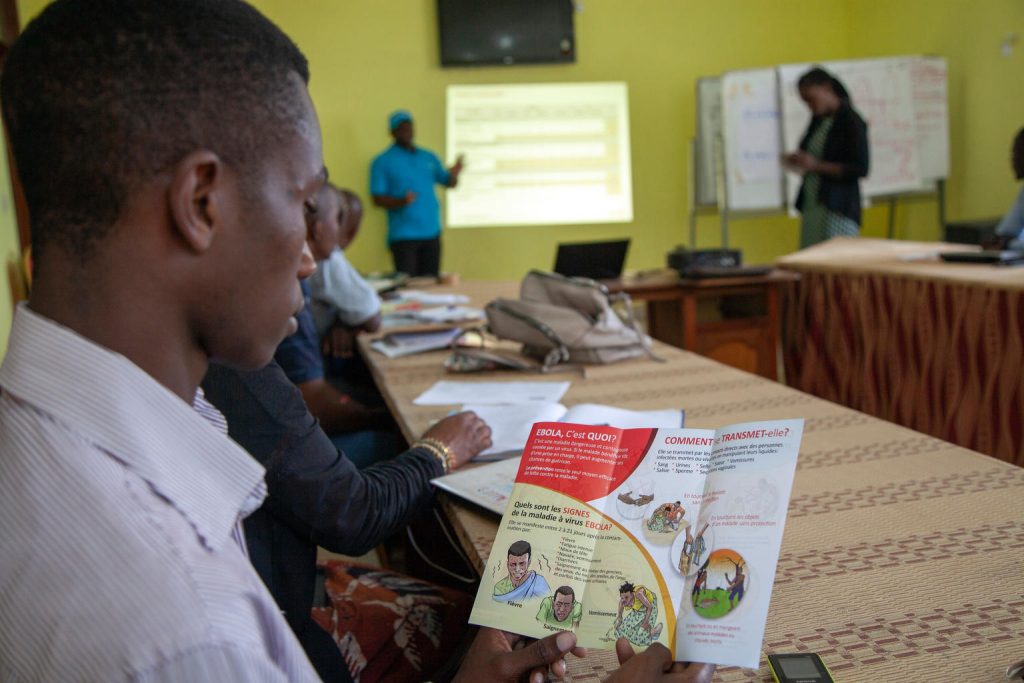This note provides an overview of a selection of key messages related to the Ebola outbreak and response that were circulating on WhatsApp and in the local media in the Grand Nord (Beni and Lubero territories), DRC, in November and December 2018. The note was prepared by Rachel Sweet (Harvard University) with support from Juliet Bedford (Anthrologica). Rachel Sweet is a leading expert on North Kivu and is collaborating with the Social Science in Humanitarian Action Platform to support the response.
Briefing
Media and Local Messages on Ebola in the Grand Nord, DRC

UNICEF/Naftalin
On 9 August 2018, a humanitarian partner reads an Ebola prevention pamphlet during a UNICEF training in prevention messaging in Ebola-hit North Kivu, DRC. As at 8 August 2018, UNICEF briefed 60 community leaders in Mabalako health zone and 581 community members in Beni health zone on Ebola prevention messages as well as distributed 200 posters and 300 Ebola prevention pamphlets. Mass communication on Ebola prevention messages is being integrated into activities of local churches and local radio stations with 241 churches having received Ebola prevention messages and 79 local journalists being briefed.
Following the 1 August 2018 announcement by the Government of the Democratic Republic of the Congo (DRC) of a new Ebola Virus Disease (EVD) outbreak in North Kivu, UNICEF has mobilized its teams to help contain the spread of the disease and protect children. The impact of an outbreak on children can be far reaching. It’s known from earlier outbreaks in the DRC as well as in West Africa that children can be affected in various ways. Children can themselves be infected by the disease, but the impact goes beyond; it impacts their families and communities as children can lose their parents, care-givers and teachers. Access to basic services such as health care and education can become severely compromised. Also, children who are infected or whose relatives are, face stigmatization and social exclusion.
The Congolese Government has activated its response plan and called its partners, including UNICEF, to participate in the response. UNICEF has deployed a team to Beni for the response, including health specialists, communication specialists and a water, sanitation and hygiene specialist from the Ebola-response team in the Province of Equateur. Health, water, sanitation and hygiene and communication supplies have been sent to the affected areas including 300 laser thermometers to monitor the health conditions of people in the affected region and 2,000 kg of chlorine
Related content
Case study
SSHAP learning note: Building a localised approach
This learning note shares insights, experiences and lessons from SSHAP's approach to the localisation of its operational responses in sub-Saharan Africa.
Central and East Africa Hub
West Africa Hub
SSHAP
2025
Evidence review
Rapid evidence synthesis: Mpox community protection
This note presents a rapid synthesis of evidence related to community protection in countries affected by the mpox clade 1b outbreak. Synthesising evidence related to community protection for mpox Medline, Africa Journals Online and Global Index Medicus were searched. IFRC,…
SSHAP
2025
Report
Meeting report: The impact of global aid funding cuts on people and programmes in South Sudan
Report of a roundtable with government actors, academics, development partners and journalists in South Sudan on the sweeping impacts on people and programmes of aid cuts and multiple, intersecting crises.
Central and East Africa Hub
SSHAP
2025
Briefing
Key considerations: Home-based care for mpox in Central and East Africa
This brief outlines key considerations on health system requirements for safe and inclusive home-based care for mpox.
Central and East Africa Hub
SSHAP
2025


